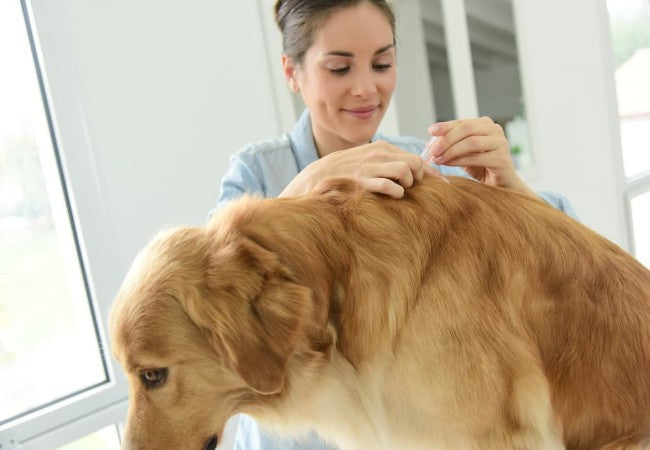Veterinary Guide to Canine Meningitis & Meningoencephalitis 2025 🐶🧠

In this article
Veterinary Guide to Canine Meningitis & Meningoencephalitis 2025 🩺🐶
By Dr. Duncan Houston BVSc
🧬 What Is Meningitis & Meningoencephalitis?
Meningitis is inflammation of the meninges—the membranes covering the brain and spinal cord; meningoencephalitis includes inflammation of the brain itself.
👥 Common Causes
- Steroid-responsive (SRMA): immune-mediated, often in young (<2 yr) breeds like Beagles, Bernese, Boxers, Pugs.
- Granulomatous or necrotizing MUO: includes granulomatous meningoencephalitis or necrotizing leukoencephalitis in small breeds like Maltese, Pugs, historic in Chihuahuas.
- Infectious: bacterial, viral, fungal, rickettsial, protozoal, or parasitic (e.g., Baylisascaris, heartworm).
- Trauma or extension: spread from ear infections, foreign bodies, or skull injuries.
⚠️ Clinical Signs
- Fever, lethargy, and anorexia.
- Neck/back pain, rigidity, posture changes.
- Muscle spasms or tremors.
- Neurologic signs if encephalitis present: seizures, circling, ataxia, head tilt, vision loss, paresis.
- Severe infections: altered mentation, collapse, shock.
🔍 Diagnostics & Evaluation
- Physical & neuro exam: assess pain, reflexes, cranial nerves, mentation.
- Lab tests: CBC, biochemistry, urinalysis, infectious disease panels (Tick, parvo, etc.).
- Advanced imaging: MRI (preferred) or CT to visualize inflammation, swelling, lesions.
- CSF tap: analysis confirms inflammatory cells (neutrophils in SRMA; mononuclear or mixed in MUO/infectious).
- Culture/PCR: for bacteria, fungal, rickettsial, and protozoal causes.
🛠️ Treatment Strategies
1. Immune‑Mediated Meningitis (SRMA, MUO)
- Start immunosuppressive prednisone (up to 2 mg/kg/day).
- Add second-line agents if needed: azathioprine, cyclosporine, cytarabine.
- Hospitalized for monitoring, analgesia, IV fluids.
2. Infectious Meningitis
- Start targeted antibiotics / antifungals / antiprotozoals based on diagnostics.
- Supportive care: pain relief, manage brain swelling (e.g., mannitol), IV fluids, seizure control.
3. Supportive Care
- Pain management: NSAIDs (if no contraindications), opioids.
- Seizure control: phenobarbital, levetiracetam.
- IV fluids, nutritional support, physical rest.
- Monitor for complications: aspiration pneumonia, bladder care, pressure wounds.
📈 Prognosis
- SRMA: Excellent – most dogs respond within days; treatment lasts 5–7 months; relapse in ~20 %.
- MUO: Guarded—treatment long-term with relapses possible; survival varies from months to years.
- Infectious: Variable—depends on pathogen, speed of intervention; fungal/protozoal generally poorer outcomes.
📱 Ask A Vet Telehealth Integration
- 📸 Share videos showing neck pain, gait, seizures, mentation.
- 🔔 Receive reminders for imaging, CSF taps, tapering steroids, or antibiotics.
- 🩺 Virtual check-ins to assess pain, neurologic signs, appetite, and hydration.
🎓 Case Spotlight: “Max” the Boxer
Max, a 14‑month‑old Boxer, presented with fever (105 °F), stiff neck, and reluctance to walk. MRI: meningeal enhancement; CSF: neutrophilic pleocytosis. Diagnosed with SRMA. Began high‑dose prednisone and azathioprine. Ask A Vet coordinated remote check-ups. Within 4 days, neck pain resolved; prednisone tapered over 6 months, treatment stopped at 7 months—Max remains in remission 🐾.
🔚 Key Takeaways
- Meningitis/MUO requires prompt diagnosis and tailored treatment.
- Key signs: fever, neck stiffness, pain, seizures, neurologic deficits.
- Diagnosis: bloodwork → MRI/CT → CSF analysis → infectious testing.
- Treat based on cause: steroids for immune, targeted meds for infectious.
- Prognosis varies: SRMA excellent, MUO guarded, infections depend on the agent.
- Ask A Vet telehealth enhances care with remote monitoring, reminders, home med delivery 📲🐕
Dr Duncan Houston BVSc, founder of Ask A Vet. Download the Ask A Vet app for expert telehealth support in diagnosing and treating meningitis—get guided imaging, CSF planning, tele-checks, medication coordination, and home delivery for full recovery 🐶📲






